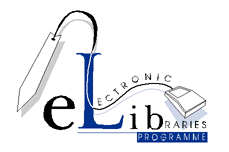The Electronic Journal and Learned Societies project
- Project web site
-
http://Journals.eecs.qub.ac.uk/
- Programme area
-
Electronic Journals
- Contact details
-
Prof. F J Smith, Project Director,
School of Electrical Engineering and Computer Science Queen's University 21 Stranmillis Road, Belfast, BT9 5AF
Phone: 01232 245133 Ext. 4072 Fax: 01232 666520
Email: FJ.SMITH@ee.qub.ac.ukProf. B T Donovan
Association of Learned and Professional Society Publishers 48 Kelsey Lane, Beckenham, Kent, BR3 3NE
Phone: 0181 658 0459 Fax: 0181 663 3583
Email: donovan@alpsp.demon.co.uk
Project description
as of 4th January 1996
Introduction
Many learned societies are considering using the electronic journal and the facilities offered by electronic networking for the publication of research findings and to promote academic interchange. However, they are deterred by the potential development costs and possible repercussions on the viability and status of their primary publications. This project sets out to establish a system that will serve as a test bed for learned societies publishing material for the library market as well as for their members. It is intended to yield information of value to the academic and learned society community as a whole and to assist them in coping with current electronic developments. It is especially concerned to help small learned societies.
Description
The application of a variety of electronic techniques to the refereeing, editing and production of academic journals will be examined. Acrobat and SGML programs will be used in fostering the production of electronic versions of well-established printed journals and in exploring the possibilities of the World Wide Web for the supply of journals to subscribers, alongside newsletters, notices of meetings and other information of value to society members. Charging mechanisms for members and for libraries will also be evaluated, and the shifts in the usage of journals and changes in the patterns of reader behaviour will also be traced.Initially, the publications of the British Psychological Society and the Society for Endocrinology will be used, with other learned societies being encouraged to participate as soon as the necessary management, hardware, and software systems are in place and known to be working well. Learned societies have already expressed considerable interest in this initiative.
Key Targets
Work with endocrinology and psychology journals will begin immediately, with the intention of achieving electronic operation within nine months or so. Additional journals will be recruited to the project as soon as the expected setting-up problems have been resolved and appropriate operating systems put in place, probably by the end of the first year. Over the ensuing two years much will be learned about the best ways of providing electronic access to journals for librarians and end users in an economic manner but with adequate recovery of the costs of production by the sponsoring societies. By the end of the third year model systems should have been developed and tested for general adoption by learned society publishers.
Participants
The partners in this project are the School of Electrical Engineering and Computer Science of Queen's University, Belfast, and the Association of Learned and Professional Society Publishers. The School has well established links with printers and publishers and considerable experience in the application of artificial intelligence in typography. Central computing facilities would be based at Queen's University and supported by a computer scientist with experience of the Internet and publishing. The Association of Learned and Professional Society Publishers is the national representative of learned society and academic publishers, with a membership representing most of the major producers of serials in science and technology and extending into the humanities. It will recruit learned societies to the project and co-ordinate their aims.Two learned societies have agreed, and are eager, to take part in the study. These are the British Psychological Society (with 18,500 members) and the Society for Endocrinology (with 1,600 members) and they are typical of their kind. Of equal importance is the fact that their publications are highly respected and representative scientific and humanities-type journals.

